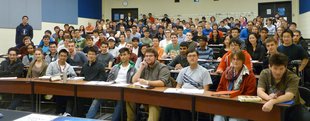12-240/Classnotes for Tuesday October 23: Difference between revisions
From Drorbn
Jump to navigationJump to search
(→==) |
|||
| (5 intermediate revisions by one other user not shown) | |||
| Line 1: | Line 1: | ||
{{12-240/Navigation}} |
{{12-240/Navigation}} |
||
= === |
|||
Definition: L(V,W) is the set of all linear transformation L: V->W |
Definition: L(V,W) is the set of all linear transformation L: V->W |
||
| Line 32: | Line 31: | ||
== Lecture notes scanned by [[User:KJMorenz|KJMorenz]] == |
== Lecture notes scanned by [[User:KJMorenz|KJMorenz]] == |
||
<gallery> |
<gallery> |
||
Image:12-240-Oct30.jpg |
Image:12-240-Oct30.jpg|Oct 30 Page 1 |
||
Image:12-240-Oct30-2.jpg |
Image:12-240-Oct30-2.jpg|Oct 30 Page 2 |
||
Image:12-240-Oct2.jpg|Oct 2 Page 1 |
|||
Image:12-240-Oct2-2.jpg |
Image:12-240-Oct2-2.jpg|Oct 2 Page 2 |
||
Image:12-240-Oct2-3.jpg|Oct 2 Page 3 |
|||
Image:12-240-Oct2-4.jpg|Oct 2 Page 4 |
|||
Image:12-240-Basis.jpg|Basis of a Vector Space |
|||
Image:12-240-TutOct4.jpg|Tutorial Oct 4 |
|||
</gallery> |
</gallery> |
||
Latest revision as of 06:37, 22 October 2014
| |||||||||||||||||||||||||||||||||||||||||||||||||||||||||
Definition: L(V,W) is the set of all linear transformation L: V->W
u V, 0 of L(V,W) (u)=0 of W (this is a l.t.str)
If L1 and L2 L(V,W), (L1 + L2) (u)= L1(u) +L2(u) (this is a l.t.str)
If c F and L L(V,W), (c*L) (u)= c*L(u) (this is a l.t.str)
Theorem: L(V,W) is a vector space
Proof: "Distributivity" c(x+y)=cx+cy
In our case need to show c(L1 + L2)= cL1 + cL2
Where c F and L1 and L2 L(V,W)
(LHS) (u)














